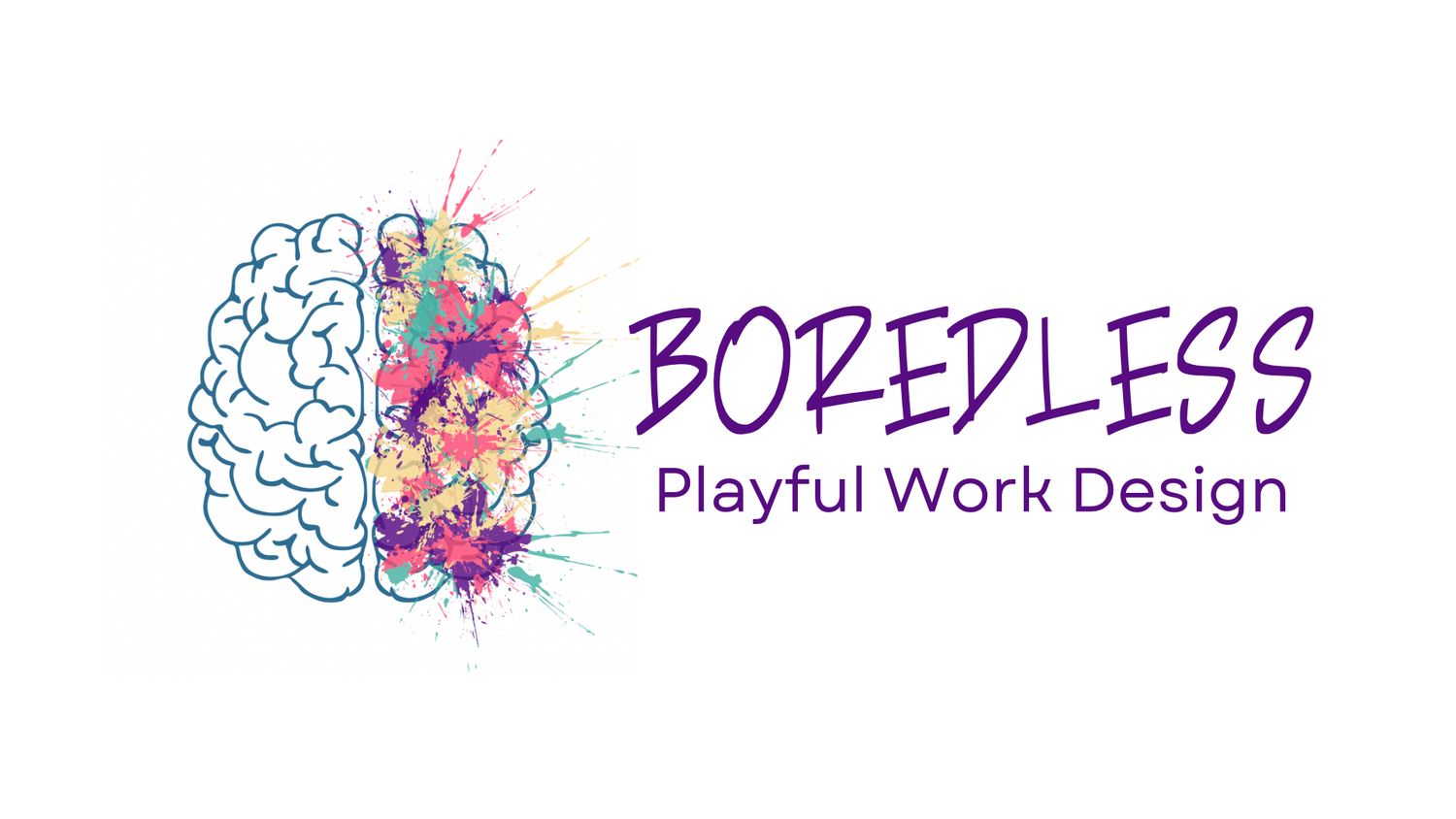Given the current business landscape, gaining a competitive advantage is critical, and companies are continually seeking novel ways to achieve it. One aspect that's often overlooked but has a substantial impact on the bottom line is employee engagement. Did you know that playful work environments are more productive, creative, and profitable? Beyond that, they have the ability to attract and retain top talent while fostering a sense of belonging and engagement.
Incorporating play into the workday is a reliable strategy to enhance productivity, create a more positive work culture, and unleash the potential of your team.
Scroll down to learn more about the Playful Team Toolkit and how it can help you create a more playful and successful team.
The Playful Team Toolkit:
For Culture Architects
Unlocking Engagement, Productivity, and Innovation
Embark on a journey of discovery and transformation through the power of play. This quarterly workshop series will provide you with the insights and skills you need to create a more positive, engaging, and productive work environment.
Our Playful Team Toolkit Workshops are not just about having fun; they are about creating a space where team members feel comfortable taking risks, exploring new ideas, and being themselves. When team members feel comfortable and supported, they are more likely to be engaged in their work, collaborate effectively, and achieve their goals.
If you are looking for ways to improve your team's performance, boost morale, and create a more positive and productive work environment, then our Playful Team Toolkit is for you.
$7k per quarter includes: Four (4) 2.5-hour workshops (1 per quarter, virtual or in-person), Twelve one-hour leadership strategy calls (monthly)
Options: make-up calls for new hires or those that missed the workshop, office/workspace design consulting, curated toy packages.
Workshop Topic Descriptions are listed below.
One year, four workshops, and limitless benefits.
Benefits to your organization:
Increased productivity: By fostering a sense of ownership and motivation among employees through a playful and engaging work environment, organizations can achieve increased productivity. Engaged employees are up to 18% more productive than their disengaged counterparts.
Increased profitability: By cultivating a highly engaged workforce through a playful and engaging work environment, organizations can achieve increased profitability. Engaged employees are more likely to be productive, creative, and innovative, leading to a 23% increase in profitability.
Enhanced creativity and innovation: Playful environments encourage exploration and risk-taking, which can lead to new ideas and solutions. When teams are able to think more creatively, they are able to come up with innovative solutions to problems that can lead to increased revenue.
Improved employee engagement and retention: Playful and engaging work environments can help attract and retain top talent. Engaged employees are more likely to be loyal to their employers and these workforces experience 43% less turnover than disengaged teams. This can lead to significant cost savings for organizations in terms of recruiting and training new employees.
Reduced absenteeism: Engaged employees are less likely to take sick days. A study by Gallup found that companies with highly engaged employees have 81% lower absenteeism rates. This can lead to cost savings for the organization in terms of reduced sick pay and lost productivity.
-
The Science of Playful Culture: Unlocking Transformation Through Play
In today's fast-paced and ever-changing world, creating a positive and engaging company culture is essential for attracting and retaining top talent. Play can be a powerful tool for designing a culture that fosters trust, psychological safety, belonging, and engagement.
Rooted in neuroscience, play helps us develop and support the skills needed to create a culture of transparency and connection. When we play, we are more likely to take risks, be open to feedback, and collaborate effectively.
During this workshop, teams will:
~Explore the neuroscience of play and its impact on company culture
~Learn how to incorporate play into routines and behaviors to create a more positive and engaging work environment
~Discover strategies for using play to foster trust, psychological safety, belonging, and engagement
~Develop ideas for creating a playful community that supports your company culture
Learning Outcomes
~Gain a deeper understanding of the neuroscience of play and its impact on company culture
~Learn how to incorporate play into your work routines and behaviors to create a more positive and engaging work environment
~Discover strategies for using play to foster trust, psychological safety, belonging, and engagement
~Develop ideas for creating a playful community that supports your company culture
~Leave with practical tools and techniques for implementing playful work design in your organization
Organizations that utilize playful work design experience increased connection across teams, 12% more productivity, 41% less absenteeism, 21% increase in profitability.
-
The Failure Advantage: Igniting Learning, Growth, and Innovation
Failure is an inevitable part of life and work. It can be discouraging, embarrassing, and even painful. However, failure also presents a unique opportunity for learning, growth, and innovation.
In today's rapidly changing world, the ability to learn from failure is essential for success. Teams that are able to embrace failure and use it as a learning opportunity are more likely to be innovative and adaptable.
During this workshop, we will:
~Explore the power of failure as a transformative tool
~Learn how to reframe failure as a learning opportunity
~Develop strategies for coping with failure and overcoming the fear of failure
~Discover how to use failure to fuel innovation
Learning Outcomes
~Reframe failure as a learning opportunity rather than a setback
~Identify and analyze your own and others' failures to extract valuable lessons
~Develop a growth mindset that embraces failure as a necessary step on the path to success
~Apply strategies for coping with failure and overcoming the fear of failure
~Collaborate with others to fail together and learn from each other
~Celebrate failure and share your stories with confidence and humor
Failure is not the opposite of success; it is a stepping stone on the path to success. By learning to embrace failure, teams can become more resilient, innovative, and successful.
-
The Playful Team: Leveraging Personal Play Identities for Team Success
Just as understanding personality archetypes can foster greater understanding, empathy, and appreciation for individual differences within teams, gaining insights into Personal Play Identities can have a profound impact on team dynamics.
Teams that are able to leverage the diverse play styles of their members are more likely to be creative, collaborative, and successful.
During this workshop, we will:
~Explore the concept of personal play identities
~Learn about the four distinct play styles
~Discover how to identify your own personal play style
~Gain insights into the play styles of your teammates
~Develop strategies for leveraging the diverse play styles of your team
Learning Outcomes
~Gain a deeper understanding of the concept of personal play identities
~Identify your own personal play style
~Gain insights into the play styles of your teammates
~Learn how to leverage the diverse play styles of your team to enhance communication, collaboration, and creativity
~Develop strategies for creating a more playful and engaging team environment
By understanding and appreciating the diverse play styles of their members, teams can create a more cohesive, connected, and successful work environment.
-
The Power of Flow: Cultivating Peak Performance and Experience
Flow is a state of heightened focus, engagement, and absorption in which individuals experience a sense of effortless action, timelessness, and complete involvement in the task at hand. It is often described as being "in the zone" or "on a roll."
In today's demanding and competitive world, the ability to achieve flow is essential for peak performance. Teams that are able to cultivate a state of flow are more likely to be productive, creative, and successful.
During this workshop, we will:
~Explore the nature of flow and its relationship to peak performance
~Learn about the neuroscience of flow and the key factors that contribute to its occurrence
~Gain practical insights into how to create the conditions for flow in your own life and work
~Discover strategies for helping others achieve flow
Learning Outcomes
~Gain a deep understanding of the concept of flow
~Identify the key factors that contribute to flow
~Develop practical strategies for getting into flow on demand
~Learn how to help others achieve flow
~Apply the principles of flow to enhance team performance
Flow is a powerful tool that can be used to achieve peak performance. By understanding the nature of flow and the factors that contribute to its occurrence, individuals and teams can learn to harness its power to achieve their goals.
Acey is a leading expert on the neuroscience of play and its impact on organizational culture. She has spent years researching and studying the effects of play on employee engagement, productivity, creativity, and innovation.
Acey is also a skilled facilitator and speaker. She has a deep understanding of how to create a safe and supportive environment where people can learn, grow, and experiment. In addition to her expertise in play, Acey is also a business leader with a proven track record of success. She has helped organizations of all sizes to achieve their goals and objectives.
Acey is a passionate advocate for the power of play to transform organizations. She believes that play is not just about having fun; it is a powerful tool that can be used to drive innovation, build relationships, and create a more positive and productive work environment.


